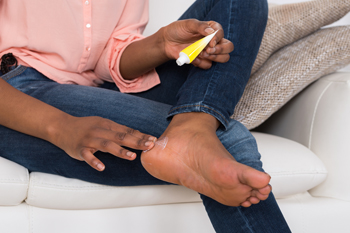
Cracked heels develop when the skin on the heels becomes dry and thick, leading to fissures that can deepen over time. People with diabetes, hypothyroidism, psoriasis, or allergic dermatitis may be more likely to experience heel fissures. Factors like standing for long periods, being overweight, or wearing open-back shoes can contribute to the problem by increasing pressure on the heels. Initially, a dry, hardened callus forms around the edge of the heel, often appearing yellow or dark brown. Without treatment, small cracks can widen, becoming painful and even bleeding. In severe cases, cracked heels can lead to severe infections like cellulitis, which require immediate medical attention. People with diabetes should be especially cautious, as deep heel cracks may result in foot ulcers. A podiatrist can remove thickened skin, prescribe medication for infections, and provide supportive footwear advice to prevent further complications. If you have cracked heels that have become painful or infected, it is suggested that you schedule an appointment with a podiatrist for an exam and treatment options.
If the skin on your feet starts to crack, you may want to see a podiatrist to find treatment. If you have any concerns, contact one of our podiatrists from Quad Cities Foot and Ankle Associates. Our doctors can provide the care you need to keep you pain-free and on your feet.
Cracked Heels
It is important to moisturize your cracked heels in order to prevent pain, bleeding, and infection. The reason cracked heels form is because the skin on the foot is too dry to support the immense pressure placed on them. When the foot expands, the dry skin on the foot begins to split.
Ways to Help Heal Them
- Invest in a good foot cream
- Try Using Petroleum Jelly
- Ease up on Soaps
- Drink Plenty of Water
Ways to Prevent Cracked Heels
- Moisturize After Showering
- Skip a Shower
- Keep Shower Water Lukewarm
- Don’t Scrub Your Feet
If you are unsure how to proceed in treating cracked heels, seek guidance from a podiatrist. Your doctor will help you with any questions or information you may need.
If you have any questions, please feel free to contact our offices located in Bettendorf, and DeWitt, IA and Rock Island, IL . We offer the newest diagnostic and treatment technologies for all your foot care needs.
